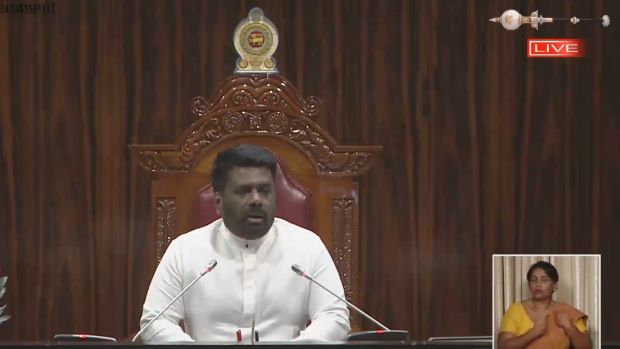Sri Lanka President vows to prevent racism, communal slogans in politics
COLOMBO – Sri Lanka’s President Anura Kumara Dissanayake, in his policy statement during the inaugural session of the new Parliament on Thursday (21), assured racism, and communal and religious slogans would not be used by politicians to capture state power in future.
Dissanayake’s National People’s Power (NPP) swept the parliament election held last week to record a landslide win with 159 seats in the 225-member parliament. This is the first time in Sri Lanka’s history that a political party received the backing of all Sinhala, Tamil, Muslim, and Catholic communities during the election.
The NPP won 21 out of 22 electoral districts and 150 out of 160 electorates, the official election results showed. It was also the first time a Marxist party-led coalition won national elections in Sri Lanka’s history.
Dissanayaka, in his policy statement, said when racism becomes a theme of a political camp; the definite consequence is counter-racism from opposition political camps.
“Racism does not remain in one place. One portion of racism will nurture and grow the other portion of racism. We have experienced this in our long history, politics, and society,” Dissanayake told the new parliament in which his party had 156 new legislators compared to the three in the last parliament.
“Although we were in different provinces, although we were far apart in cultural views, although we spoke different languages, although we practised different religions, this election has shown that we have converged into focusing on one purpose and lined up for that,” he said, adding that the election has created a very strong opportunity to build national unity, which has been a long-cherished wish in the country.
“We can have different political ideologies, but I also say one thing responsibly. We will not give in to racist politics in our country again,” he pledged.
Former president Gotabaya Rajapaksa used racism against Muslims after the April 2019 Easter Sunday attack, and during the COVID-19 pandemic ordered forced cremation of Muslims and Catholics, despite heavy criticism from the international community.
Sri Lanka also has seen a 26-year civil war as a result of communal-based decisions of successive governments that have deprived the rights of ethnic minority Tamils. That war killed more than 100,000 people with thousands still missing amid widespread human rights violations.
The country also has seen riots targeting ethnic minority Tamils, Muslims, and Catholics, mainly for political reasons in the past.
Dissanayake pledged his government will not allow religious extremism to rise its head “at any cost”.
“Our people have been affected enough by communal conflicts. This land has been soaked with blood. Rivers have been filled with people’s tears. Suspicion, distrust, and anger have been there between us. Today, our responsibility as representatives of this parliament is to not create a state like this for our future children,” he said.
“We have the responsibility to do politics with whatever slogans, it could be economy, it could be democracy. You can use anything you want. But we will not allow the creation of communal and religious slogans to capture political power in the country,” he vowed.
-economynext.com



Comments are closed, but trackbacks and pingbacks are open.